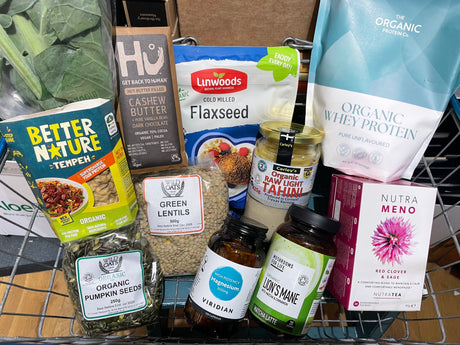Why Gut Health Is Important for Digestion, Immunity, and Overall Wellbeing
Your gut does more than digest food: it’s a central hub for your overall wellness. Healthy gut function supports nutrient absorption, immune resilience, energy levels, and even mood through the gut‑brain axis. Imbalances in your microbiome can also influence skin health, hormones, and inflammatory responses throughout the body.
6 Practical Ways to Improve Your Gut Health Naturally
-
Prioritise a wholefood, plant‑rich diet
Focus on vegetables, fruits, legumes, whole grains and nuts: These foods are rich in fibre and plant compounds that feed beneficial gut bacteria. Eating a variety of colours daily increases the range of nutrients your microbes thrive on. -
Include prebiotic and probiotic foods
Prebiotics (found in garlic, onions, leeks, asparagus and bananas) feed good bacteria, while probiotics in fermented foods like yoghurt, kefir, sauerkraut, kimchi and miso help introduce and support diverse microbes. -
Stay hydrated and eat mindfully
Plenty of water supports digestion and nutrient absorption, and eating without distraction (chewing thoroughly, taking your time) helps your body signal fullness and promotes comfortable digestion. -
Manage stress, sleep and movement
Chronic stress, poor sleep and inactivity can disrupt your gut‑brain communication and microbiome balance. Simple habits like regular movement, relaxing routines and consistent sleep can make a big difference. -
Limit ultra‑processed foods and added sugars
Processed ingredients, emulsifiers and artificial sweeteners can harm microbial balance. Choose minimally processed options to nourish a diverse and healthy gut ecosystem. -
Consider targeted support when needed
If symptoms persist, working with a health practitioner to test for imbalances and consider appropriate supplements (e.g., specific probiotics) can help you address root causes.
5 Signs Your Gut Is Unhealthy and Needs Support
Common indicators your gut may be out of balance include:
- Indigestion and reflux
- Bloating and abdominal discomfort
- Nausea
- Irregular bowel habits (constipation or diarrhoea)
- Persistent fatigue or low energy
Remember that gut dysfunction can also contribute to skin issues, immune sensitivity, mood changes, and hormonal symptoms.
How to Tell If Your Gut Is Healthy – 3 Key Indicators
- Regular, comfortable bowel movements
- Well‑formed stool with a consistent texture
- Stable energy levels and feeling nourished after meals
Top 3 Gut-Boosting Foods to Improve Digestion and Microbiome
1. Fermented foods
Kefir, Kombucha, Saeurkraut, Kimchi, Miso. These foods are rich in live probiotics that support microbial diversity.
2. Polyphenol-rich foods
Berries, cocoa, green tea, olive oil, herbs and spices act as prebiotics and antioxidants.
3. Gut-soothing broths
Bone broth (or cabbage broth for plant‑based diets) provides collagen and glutamine to help gut lining repair.
Probiotics, Supplements, and Gut Health Testing: What You Need to Know
While food should always come first, targeted supplements (like specific probiotics) can support recovery when gut function is compromised. High‑quality probiotic supplement products with well‑researched strains and minimal additives are best. Comprehensive stool tests, interpreted by a qualified practitioner, can reveal opportunities for targeted support and faster progress.
Gut Health and Skin: How Digestion Impacts Acne, Eczema, and Skin Wellness
Poor gut balance can influence your skin through the gut‑skin axis. Imbalance‑driven inflammation, or nutrient malabsorption can show up as acne, eczema, rosacea, or general irritation. Supporting digestion can therefore improve skin outcomes over time.
How Long Does It Take to Improve Gut Health? Timeline and Expectations
Unfortunately, there is no single timeline, as everyone’s biology and circumstances differ. Some people notice changes quickly after dietary shifts, while others benefit from longer‑term strategies and professional support. The key is consistency with nourishing habits.
How to Restore Your Gut After Antibiotics
Antibiotics can disrupt your microbiome. Taking a targeted probiotic supplement during and after a course (as advised by a practitioner) may help restore beneficial bacteria more effectively.
We like specially formulated probiotic products to take alongside antibiotics (such as Optibac 'For Those On Antibiotics'). After finishing an antibiotic course, it's good to take a course of high-strength probiotics (such as Biokult 'Boosted') to add back in as many of those 'good guys' as possible.
Every gut is unique. For personalised guidance on diet, supplements, or lifestyle changes, speak with one of our Nutritional Therapists in-store. They’d be delighted to help you find what works best for you.



